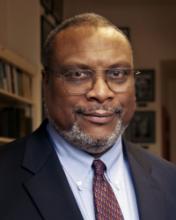The Department of History is saddened by the death of Professor Emeritus Quintard Taylor, who passed away September 21, 2025. A renowned scholar of Black history, Taylor joined the department in 1999 and retired from teaching in 2018. He continued to research and write on African American history following his retirement, devoting particular attention to the award-winning website that he founded, BlackPast.org, the world’s largest online encyclopedia dedicated to Black history.
Taylor’s career path may be seen as a series of westward steps from one coast to the other. Growing up in Tennessee, he was encouraged from an early age to study Black history. He attended St. Augustine’s College, a private, historically Black university (HBCU) in Raleigh, North Carolina, earning a B.A. in American history in 1969. From there, he went on to the University of Minnesota to complete a master’s degree in American history with a focus on urban history. After completing his M.A. in 1971, Taylor accepted a position as an assistant professor in the still new Black studies program at Washington State University. It was there that he first became drawn to the study of African Americans in the American West. In 1975, Taylor returned to Minnesota to complete his Ph.D., writing his dissertation on the history of African Americans in the Pacific Northwest. He joined the history faculty at California Polytechnic State University in San Luis Obispo in 1977. In 1990, Taylor was hired as a professor of history at the University of Oregon in Eugene, where he served as department chair and director of the ethnic studies program. His final professional move came in 1999 when he moved to Seattle after being appointed as the Dorothy and Scott Bullitt Professor of American History by the University of Washington.
The Bullitt Professorship specifies that the holder should be a prolific and respected scholar as well as an engaging and enthusiastic lecturer in the classroom, qualifications that Taylor met and exceeded. At the time of his appointment, he was the leading historian on Blacks in the American West. Over the course of his career, Taylor authored more than a half-dozen books, as well as writing, editing, and co-authoring a wide range of articles, book chapters, and anthologies. Among academics, though, he is best known for his books The Forging of a Black Community: A History of Seattle’s Central District, 1870 through the Civil Rights Era (1994) and In Search of a Racial Frontier: African Americans in the American West, 1528-1990 (1998). He wrote for everyone—other scholars, students, and for the general public—and always aimed to remind readers that Blacks were everywhere in U.S. history, not just the South. Taylor conceived and developed key insights in the study of Blacks in the American West. For example, his comparative treatment of African Americans and Asian Americans in modern Seattle not only addressed important questions of economic strategies but also reminded readers of the benefits of not limiting oneself to binary racial history.
As terrific as he was as a scholar, Taylor was equally brilliant in front of students. His popularity as an educator extended beyond the history department and across all levels from first-year undergraduates to doctoral candidates. He regularly taught the department’s U.S. history survey course (often volunteering to do so) and his courses on African American history, such as African Americans in the American West, African American History, 1865 to the Present, and African American Urban History, were among some of the most popular undergraduate and graduate courses.
Throughout his career, Taylor also demonstrated a strong record of service not only to the department, the university, and the profession, but also to the wider community. He believed strongly in the value of public engagement and rarely declined an offer to speak—he once accepted an invitation to give an address to a middle school in Los Angeles. In addition to public facing events, Taylor also worked behind the scenes in engaging the public with history, serving as historical consultant for the National Museum of African American History and Culture as well as most recently on Kevin Costner’s series “The West.”
While most historians were slow to take advantage of the internet, Taylor embraced it and founded BlackPast.org in 2007. Originally designed to be a repository for his and his students’ research, it grew to become one of the cornerstones of scholarship on African American and global African history. In 2023 alone, the site had more than 6.5 million visitors and 7,200 separate entries written by nearly 1,000 contributors. BlackPast.org is perhaps one of Quintard Taylor’s greatest legacies.
Taylor received considerable recognition throughout his career for both his scholarship and service from organizations such as the Washington State Historical Society, the Association for the Study of African American Life and History, and the Western Writers of America, among others. In 2019, the University of Washington named him as a University Faculty Lecturer, a top honor that recognizes those whose scholarship has made a lasting impact upon the profession and society as a whole. As part of this honor, Taylor presented the lecture “Six African American Women Who Changed the American West (and the World),” which can be viewed on the university’s YouTube channel along with many others public lectures he gave through the UW. That same year in which the university honored him, the Department of History did the same and dedicated its seminar room as the Quintard Taylor Jr. History Seminar Room in recognition of his work in bringing communities together.
Quintard Taylor’s passing is an indelible loss for the department, university, profession, and community, but he leaves behind a powerful legacy. The department mourns his passing but finds inspiration in his many achievements, and it commits itself to building upon his astonishing record of scholarship, teaching, and public engagement.
